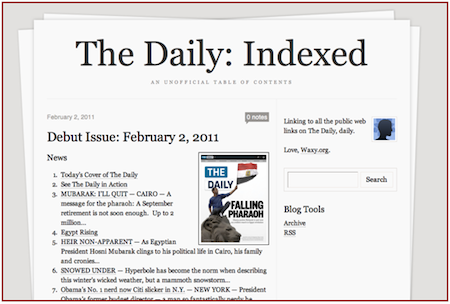
So Andy Baio‘s done a cool thing. He noticed that The Daily has posted, so far, almost every article in the app to its official website — but that it’s done so without indexing the articles in a central spot. (“They spent $30M on it,” he notes, “but apparently forgot a homepage!”) So — cognitive surplus, for the win! — he created one.
The Daily: Indexed is a Tumblr dedicated to gathering and tracking the links to all the free, public, web-friendly articles on The Daily. (The project, though at first blush it may seem either parasitic or (more likely on Tumblr) ironic, seems intended as a complementary — and, ostensibly, complimentary — gesture. “If you like the articles,” Baio writes, “go subscribe!”)
It’s a neat feature — a little open-web link-love for The Daily, perhaps even in spite of itself. But beyond the New Media Ecosystem implications of an unauthorized Tumblr sharing The Daily’s content just to be nice, it’s also worth noting the content of the index itself. Scroll down the list of today’s stories, for example, and you’ll find some pretty compelling teasers, in delightfully tabloidy CAPITAL LETTERS:
– TAKEN BY STORM (about this week’s most recent snowpocalypse);
– GABBY’S TOUCHING VIDEO (about Rep. Gabrielle Giffords’ recovery);
– “IT’S REALLY CRAZY HERE” (about Egypt);
– AIR SECURITY KEEPS IT IN YOUR PANTS (about new TSA scanners that might obscure the “naughty bits”);
– OUTDOOR BUTT-OUT (about new fines for smoking in Central Park);
…and, my personal favorite: “AMISH SMUGGLERS’ SHADY MILK RUN” (about, well, pretty much exactly what the blurb suggests).
They’re awfully and awesomely New York Post-tastic, full of the kind of general verve and occasional wit and juvenile punchiness — HEY!HEY!LOOKATME! — that gives Post headlines their love-to-hate/hate-to-love appeal. And they’re like that because, though the stories Baio’s linked are there on the web, they’re not really of the web. They’re of, you know, an app. And, more to the point, they’re for an app. Which means that SEO concerns (“a priest walks into a bar/pub/speakeasy/watering hole/saloon/etc.”) need not apply to headlines on The Daily the way they do to stories clawing for rank on the indexed pages of the open web. App-based headlines lack that vague air of mechanized neediness that can characterize their open-web counterparts. They don’t need to scrounge; they need simply to seduce. And if they can do that while working in a reference to AMISH SMUGGLERS, all the better.
Headlines, I know, are a small thing in the scheme of things, and they’ll have approximately nothing to do with the overall success, journalistic or otherwise, of The Daily. But much has been made — rightly, I think — of The Daily’s back-to-the-future sensibility: With its cutting-edge platform, it’s trying to reclaim something journalism has lost. And one little part of that something might just be the artistry that goes into a good headline: the wit and whimsy that, in summarizing a story, also manages to sell it.
Update: Looks like The Daily’s index was created both to provide a service and make a point. As Baio put it in an update to his original Tumblr post: “I love that this kind of experimentation is happening in journalism. I love journalism dearly and want to see new models emerge, and charging for content is a great way to align a media organization’s interests with those of its readership. That said, if you do charge for access, you can’t publish free versions to the web and hope that people don’t find them.”